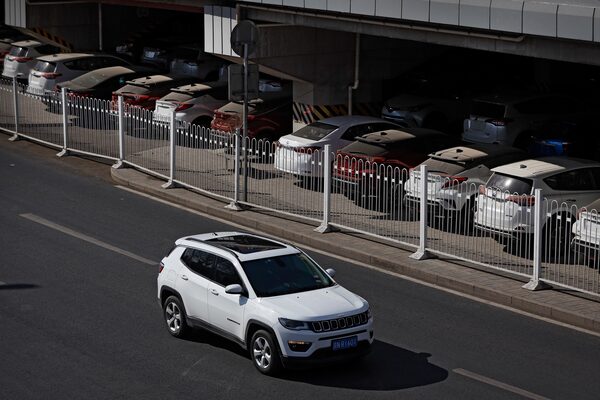
China’s auto sales declined 9.6 per cent from 2018 levels to 21.4 million sedans, SUVs and minivans.Andy Wong/The Associated Press
China’s auto sales fell for a second year in 2019 as a trade war with Washington and an economic slowdown depressed consumer confidence and demand for electric vehicles weakened, an industry group reported Monday.
The downturn is squeezing global and Chinese automakers that are spending billions of dollars to meet government mandates to sell electric vehicles.
Sales in the industry’s biggest global market declined 9.6% from 2018 levels to 21.4 million sedans, SUVs and minivans, according to the China Association of Automobile Manufacturers.
Total vehicle sales, including trucks and buses, was off 8.2% at 25.8 million.
After two decades of explosive growth, Chinese auto sales fell 4.1% in 2018 as unease over the tariff war with President Donald Trump and slowing economic growth prompted consumers to put off big purchases.
Forecasters expect sales to level off this year, but that would be more than 3 million units below 2017’s peak of 24.7 million.
“Chinese industry sales saw signs of stabilization in 2019,” said Bernstein analysts Robin Zhu, Luke Hong and Xuan Ji in a report last week. “We think consensus expectations for a flat volume year in 2020 are reasonable but consider higher more likely than lower.”
December sales were off 0.1% from a year earlier, CAAM said, an improvement over double-digit declines in previous months. The group gave no December sales total, but based on other CAAM data it would be about 2.2 million vehicles.
Sales of electric and gasoline-electric hybrid sedans and SUVs in 2019 sank 4% from a year ago to 1.2 million. That still would make China the technology’s biggest market by far, accounting for at least half of global purchases.
Electrics sales rose by double digits in early 2019 but plunged after Beijing ended subsidies to buyers in July. Regulators shifted the burden of promoting the technology to automakers by imposing mandatory sales targets.
Communist leaders are trying to accelerate industry development by ending curbs on foreign ownership of automakers.
Global brands that until now were required to work through joint ventures with state-owned Chinese partners were allowed full ownership in electric car manufacturing starting last year, reflecting official confidence local brands can compete directly with foreign rivals.
Limits on foreign ownership are to be removed from the whole auto industry by next year.
Despite those changes, most foreign automakers are expected to stay in joint ventures with Chinese partners to take advantage of their government connections.
General Motors Co. said earlier 2019 sales by the company and its Chinese partners fell for a second year, declining 15% to just under 3.1 million vehicles. GM sales in China peaked at just over 4 million units in 2017.
Volkswagen AG said 2019 sales rose 1.7% to 3.2 million, edging past GM to claim at least temporarily the status of China’s biggest auto brand.
Sales by Ford Motor Co.’s joint ventures fell 26.1% to 567,854. Sales declined 14.7% in the final quarter of 2019.
“The pressure from the external environment and downward trend of the industry volume will continue in 2020,” said the CEO of Ford Greater China, Anning Chen, in a statement.
Nissan Motor Co. sales were off 1.1% at 1.5 million units. December sales fell 4.5% from a year earlier to 168,262.
BMW AG, Europe’s biggest luxury brand, reported sales up 13.1% to a record 723,680. December sales rose 8% to 67,897.
Sales by Chinese brands tumbled 15.8% over 2018 to 8.4 million vehicles. More than half of that was accounted for by sales of lower-cost Chinese SUVs, which sank 4.2% to 4.9 million.
BYD Auto, one of the world’s biggest electric vehicle brands by sales volume, said 2019 deliveries fell 11.4% to 461,399. December sales fell 38% to 43,179.
Geely Holding, best known abroad as the owner of Sweden’s Volvo Cars, said its Geely Auto, Volvo and Geely New Energy brands sold 2.2 million vehicles in 2019.
Geely Auto includes the LYNK & Co. and all-electric Geometry brands and stakes in Malaysia’s Proton and Britain’s Lotus.